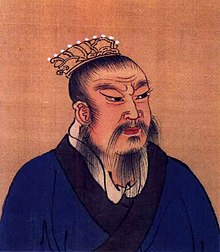
Back غاوزو إمبراطور هان Arabic جاوزو امبراطور هان ARZ Liu Bang AST قائوزو (ایمپیراتور) AZB Лю Бан Bashkir Лю Бан Byelorussian Хан Гаодзу Bulgarian ལིའུ་པང་། Tibetan Emperador Gaozu de Han Catalan Làu Băng CDO
This article has multiple issues. Please help improve it or discuss these issues on the talk page. (Learn how and when to remove these messages)
|
| Emperor Gaozu of Han 漢高祖 | |||||||||||||
|---|---|---|---|---|---|---|---|---|---|---|---|---|---|
 a Ming dynasty portrait of Liu Bang | |||||||||||||
| Emperor of the Han dynasty | |||||||||||||
| Reign | 28 February 202[1] – 1 June 195 BC | ||||||||||||
| Successor | Emperor Hui | ||||||||||||
| King of Han | |||||||||||||
| Reign | c. March 206[2] – 28 February 202 BC | ||||||||||||
| Born | 256 BC[3] Feng, Pei, state of Chu[4] | ||||||||||||
| Died | 1 June 195 BC (aged 61) Chang'an, Han dynasty | ||||||||||||
| Burial | |||||||||||||
| Consorts | |||||||||||||
| Issue |
| ||||||||||||
| |||||||||||||
| House | Liu | ||||||||||||
| Dynasty | Han | ||||||||||||
| Father | Liu Tuan | ||||||||||||
| Mother | Wang Hanshi | ||||||||||||
| Emperor Gaozu of Han | |||||||||||||||||||||||||||||
|---|---|---|---|---|---|---|---|---|---|---|---|---|---|---|---|---|---|---|---|---|---|---|---|---|---|---|---|---|---|
| Traditional Chinese | 漢高祖 | ||||||||||||||||||||||||||||
| Simplified Chinese | 汉高祖 | ||||||||||||||||||||||||||||
| |||||||||||||||||||||||||||||
| Personal name | |||||||||||||||||||||||||||||
| Traditional Chinese | 劉邦 | ||||||||||||||||||||||||||||
| Simplified Chinese | 刘邦 | ||||||||||||||||||||||||||||
| |||||||||||||||||||||||||||||
Emperor Gaozu of Han[a] (256 – 1 June 195 BC[5]), also known by his given name Liu Bang, was the founder and first emperor of the Han dynasty, reigning from 202 to 195 BC. He is considered by traditional Chinese historiography to be one of the greatest emperors in history, credited with establishing the first Pax Sinica, one of China's longest golden ages.[not verified in body]
Liu Bang was among the few dynastic founders to have been born in a peasant family.[6] He initially entered the Qin dynasty bureaucracy as a minor law enforcement officer in his home town in Pei County, within the conquered state of Chu. During the political chaos following the death of Qin Shi Huang, who had been the first emperor in Chinese history, Liu Bang renounced his civil service position and became a rebel leader, taking up arms against the Qin dynasty. He outmanoeuvred rival rebel leader Xiang Yu to invade the Qin heartland and forced the surrender of the Qin ruler Ziying in 206 BC.
After the fall of the Qin dynasty, Xiang Yu, as the de facto chief of the rebels, divided the former Qin Empire into the Eighteen Kingdoms, with Liu Bang forced to accept control of the poor and remote region of Bashu (present-day Sichuan, Chongqing, and southern Shaanxi), and assuming the title "King of Han". Within the year, Liu Bang broke out with his army and conquered the Three Qins, starting the Chu–Han Contention, a civil war among various forces seeking to inherit the Qin dynasty's former supremacy over China.
In 202 BC, Liu Bang emerged victorious following the Battle of Gaixia, unified most of China under his control, and established the Han dynasty with himself as the emperor. During his reign, Liu Bang reduced taxes and corvée labour, promoted Confucianism, and suppressed revolts by the rulers of vassal states not from his own clan, among many other actions. He also initiated the policy of heqin, a system of arranged marriages between nobles, to maintain peace between the Han Empire and the Xiongnu following the Han defeat at the Battle of Baideng in 200 BC. He died in 195 BC and was succeeded by his son Liu Ying.
- ^ According to Liu Bang's biography in the Book of Han, he was crowned emperor on the jiawu day of the second month of the fifth year of his reign (including his tenure as King of Han). This corresponds to 28 February 202 BC in the proleptic Julian calendar.
- ^ According to Liu Bang's biography in the Book of Han, he was created King of Han in the second month of the first year of his reign (including his tenure as King of Han). This corresponds to 12 March to 10 April 206 BC in the proleptic Julian calendar.
- ^ This is the birth year reported by Huangfu Mi
- ^ Li Zude (李祖德) (2012). 刘邦祭祖考——兼论春秋战国以来的社会变革. 中国史研究 [Journal of Chinese Historical Studies] (in Chinese). 34 (3). CNKI: 11–58.
- ^ According to Liu Bang's biography in the Book of Han, he died on the jiachen day of the fourth month of the 12th year of his reign (including his tenure as King of Han). This corresponds to 1 June 195 BC in the proleptic Julian calendar.
- ^ "Gaozu Emperor of Han Dynasty". Encyclopædia Britannica.
Cite error: There are <ref group=lower-alpha> tags or {{efn}} templates on this page, but the references will not show without a {{reflist|group=lower-alpha}} template or {{notelist}} template (see the help page).